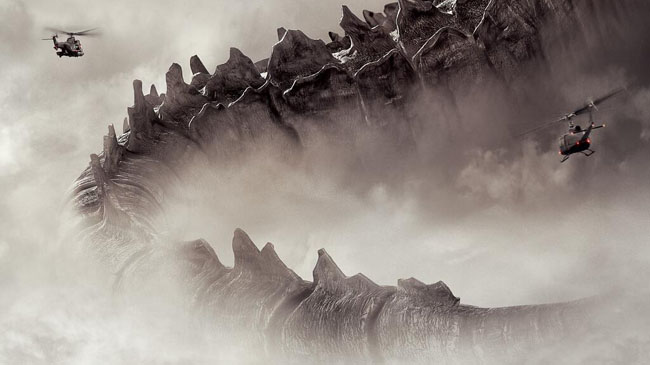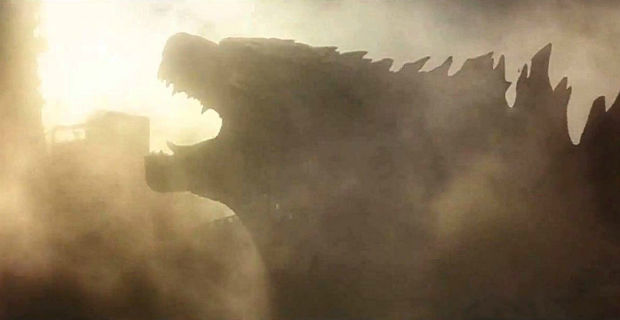And like a lot of dreams, there’s a monster at the end of it.

Injecting humanity into a Godzilla film, in which surely the central allure is chaos and spectacle, may be something of a paradox. But then, last year’s utterly abysmal Pacific Rim proved conclusively that watching giants duke it out isn’t enough to create compelling cinema on its own. And so monster filmmakers are left with somewhat of a quandary – how to balance complete destruction with personal intimacy. It is a delicate path to tread, making us care about what’s going on 200 feet in the air as well as what’s going on at ground level. Most disaster films fail at both.
There’s a rich history to Godzilla. Ishirô Hondo’s original Gojira was released by Japanese production company Toho in 1954, a conspicuous metaphor for the growing Atomic anxiety. Over the years, there have been countless iterations of the beast, appearing as both villain or ally depending on the film, with varying degrees of adherence to the creature’s nuclear heritage. Toho has been responsible for 27 sequels and there was even a Hanna-Barbera animated series during the late 1970s. Roland Emmerich’s 1998 Godzilla notoriously got just about everything wrong with the character and its legacy as possible. Gareth Edward’s new Godzilla manages to get the lord of lizards back on a promising track, but considering in how many areas it succeeds, the film is plagued by reasonably fundamental problems.
Joe Brody (Bryan Cranston) is a nuclear physicist stationed at a power plant in Japan. His life is devastated when a mysterious catastrophe at the plant results in the death of his wife (Juliette Binoche). Fifteen years later, Brody’s estranged son Ford (Aaron Taylor-Johnson) heads to Japan to bail his father, who has been caught trespassing in the area of the destroyed power plant, out of jail. Living a substandard existence (“I don’t get many visitors”), Brody is driven by an obsessed belief that the destruction of the plant fifteen years earlier wasn’t caused by some natural disaster, but by something far more powerful and threatening. On Brody’s insistance, the two break back into the quarantined zone, where they are subsequently arrested and presented to Dr. Ichiro Seriweza (Ken Watanabe), who’s interest is sparked by Brody’s enthusiasm.
There’s a lot to admire about Gareth Edwards’ Godzilla, which is one of the most visually inspired disaster films ever made. There’s a real artistry to the cinematography, which dwarfs even skyscrapers with its enormous scale. It’s impressive just how real Edward’s manages to make the fantastical concept of giant monsters battling in downtown San Francisco. Alexandre Desplat’s score is suitably ominous, evoking early John Williams. Spielberg is an obvious tonal influence, particularly his work on Jurassic Park and Close Encounters of the Third Kind, as is Christopher Nolan’s recent work on his Batman films. Grounding a Godzilla film in reality the way Nolan did with Batman might seem like an oddity but Edward’s pragmatic approach ultimately connects the audience with the destruction far more than Pacific Rim or Emmerich’s Godzilla ever did.
Unfortunately, this sober approach to the outlandish also means that Godzilla has less leeway regarding suspension of disbelief. The film is troubled by weak characters and even weaker plot points. Underneath the gritty exterior there’s just not enough thought behind motivations and events. Plans are executed without clarification and the characters are for the most part underdeveloped or implausible. Watanabe’s Dr. Seriweza has an astonishing understanding of Godzilla’s motivations considering how little is known about the creature, and if he’s just guessing then he’s playing a game with remarkably high stakes. Aaron Taylor-Johnston as Ford is particularly lacklustre, incomprehensibly downplaying the lead role in a Godzilla movie. Realism is interesting, but a certain degree of self-awareness is also important in a film about a 200-foot monster.
Edwards spends a lot of time focusing on the military response to the disaster. While the military would certainly be one of the most important elements of a response to a Godzilla attack and it also helpfully means that Ford, a Marine, can hop from one area of destruction to another, there’s something incredibly mundane about approaching a disaster film from a military perspective, particularly when more time could be spent on character development. And it’s the characters that let Godzilla down immensely, as its just not very interesting whenever the film is not focused on mammoth destruction.
Edwards has a fantastic knack for blowing things up and making his destruction feel exhilaratingly immediate. The film ambitiously marries B-Movie spectacle with the somber tone of recent Christopher Nolan films, but never manage harmonise the two fluently. Godzilla is wondrous to look at, but there’s something amiss when the monster is more human than the humans.
6/10
For more Reviews, click here. If you’re digging ReelGood, sign up to our mailing list for exclusive content, early reviews and chances to win big!
